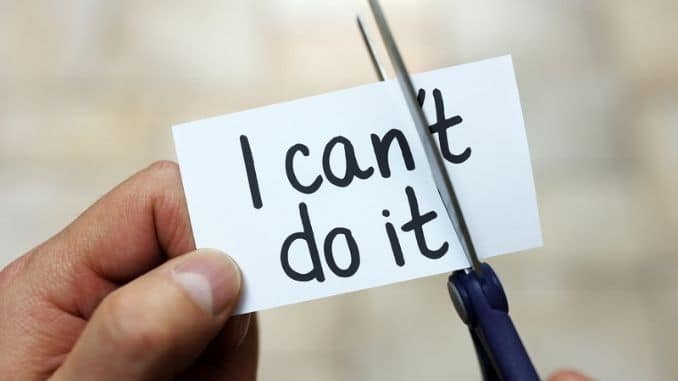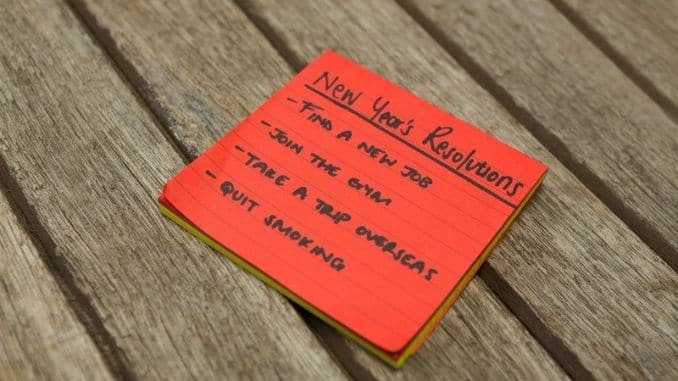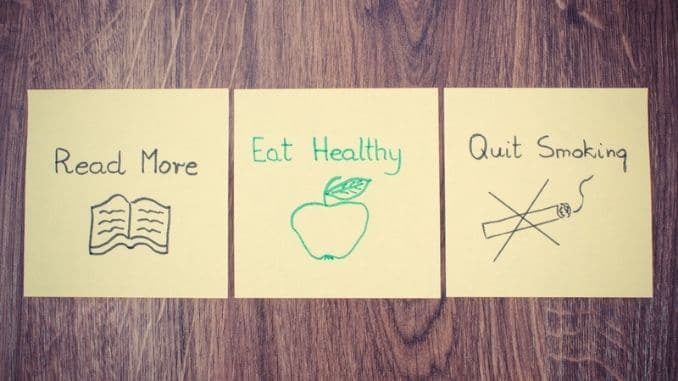Are you going to set any New Year’s resolutions this year?
Maybe you’ve tried setting them before but failed to stick with them. You’re not sure you want to do that again.
But setting New Year’s resolutions can help you create positive changes in your life while giving you a way to focus on making your dreams come true.
The key is to set them the “right” way.

Where Did New Year’s Resolutions Come From?
The practice of making New Year’s resolutions has been going on for longer than you may think. According to History.com, the ancient Babylonians were the first people to make them about 4,000 years ago. They also held celebrations in honor of the new year, though for them, it began in March, not January.
The Romans also made promises of good conduct for the coming year as early as 46 B.C., after Emperor Julius Caesar declared January 1st as the start of the calendar. In the medieval era, knights took a vow at the end of each year to re-affirm their commitment to chivalry.
By the 17th century, many Christians were known to prepare for the New Year by praying and making resolutions, and in 1813, a Boston newspaper recorded the first use of the phrase, “New Year resolution.”

The Pros and Cons of Making New Year’s Resolutions
Some people are die-hard resolution makers and enjoy engaging in the practice every new year. Others resist setting resolutions believing they won’t be able to adhere to them anyway.
No matter which camp you may be in, you’re right. Setting resolutions can be good for you, but it may also harm your progress. Let’s look at both situations.
What’s Good About Making New Year’s Resolutions?
- A fresh start. The New Year presents an opportunity for a new beginning. If you wipe the slate clean and set new goals, it can help you view the new year with a positive outlook.
- Time to reflect. To make New Year’s resolutions, you typically need to reflect on the past year, as well as on your desires for the future. Where are you now, and where do you want to go? This can help you approach the New Year with more focus.
- Opportunity for positive change. New Year’s resolutions are usually about setting goals that can improve your life. Do them right, and they inspire action. They challenge you, and if you rise to the challenge, you’re likely to experience success.
- Success builds confidence. The more success you experience making and keeping your New Year’s resolutions, the more confidence you will build within yourself that you can accomplish your goals.

What’s Bad About Making New Year’s Resolutions?
- Could be unrealistic. If you don’t carefully think through your New Year’s resolutions, they may be unrealistic, leading to failure.
- May foster self-doubt. If you fail to stick with your New Year’s resolutions, you could suffer from self-doubt and lowered self-esteem.
- Inspires self-criticism. For some people, setting New Year's resolution creates higher levels of self-criticism. When you become unhappy with your progress, you may get down on yourself, draining your motivation and energy.
- Procrastination: Because you have an entire year to meet your New Year’s resolutions, you may find it easy to procrastinate until it’s too late.

How to Choose Your New Year’s Resolutions
You can increase your odds of success with your New Year’s resolutions if you take a few steps to set them correctly.
1. Start Small
One of the main reasons people fail to keep their New Year's resolutions is that they get a bit too ambitious. You may want to lose 50 pounds, for example, make $25,000 more per year, or decide you're going to both!
Creating a resolution that's too big can set you up for failure. It's much better to set a smaller goal and reach it, then go from there. Success is motivating and will give you the energy and focus you need to keep going. So think about losing 10 pounds, or making $5000 more this year.
2. Break It Down
Another big issue with New Year’s resolutions is that the deadline is too far away. You have until next year to get this done. That invites procrastination and will likely lead to failure.
Instead, once you have made your New Year’s resolution, break it down into smaller goals that you will reach each quarter. So by March, for instance, you will have lost 3 pounds. By June, 3 more, for a total of 6. By September, three more, for a total of 9. Leaving you with only one more pound to lose by the end of the year.
Whatever your resolution may be, break it down to smaller, achievable goals, and then check in with yourself every quarter to see how you’re doing. You’ll be much more likely to succeed.

3. Make a Plan
We can’t expect ourselves to be able to make changes in our lives without some sort of guide. Creating a detailed written plan can help you stay the course.
Start by writing down the resolution—let’s stick with our example of losing 10 pounds. Then make a list of things you need to do to achieve that goal. Those may include going for a walk every day, changing your diet, joining a spinning class, learning how to do yoga, and incorporating some strength training into your routine.
Next, write down any obstacles that may be standing in your way, and how you can get around them. Maybe you can’t walk outside in the winter weather, so how will you continue to walk? You may invest in a treadmill or head out to the mall, or decide to get an exercise bike for indoor days.
Or maybe your spouse is addicted to cookies and is not going on this diet with you. How will you resist the temptation? Consider some solutions to your problems so you know how to tackle them when they come up.

4. Create a Way to Measure Your Progress
All of us need feedback. How are you doing? Are you progressing toward your goal?
You need to have some way to find out. As part of setting your New Year’s resolutions, it’s important to determine a way to measure your progress.
This isn’t hard if you’re trying to lose weight. You can weigh yourself daily, mark the number down on a chart, and review your progress each week.
But what if you resolved to think fewer negative thoughts? Then you'll need another way to measure progress. Perhaps you will keep a journal, taking five minutes each night to write down the negative thoughts you had that day, as well as the positive. As you go, you try to increase the positive and reduce the negative.
What if you want to keep a cleaner house? Maybe you use before and after photos, and post them somewhere you can regularly see them.
You get the idea. You need some way to create evidence of the actions you’re taking and the outcomes.
5. Plan Rewards
What will you do if you keep your New Year’s resolution?
We often fail to think about this, but it’s important to incorporate rewards and celebrations into your plan. What will happen if you lose 10 pounds (or more) by the end of the year? Maybe you will take a short holiday, or purchase that new outfit you’ve wanted. What if you make that extra $5000 a year? Maybe you will start a new savings account, or use some of the money to make a home improvement you need.
Think about this carefully, and choose something that will inspire you. You want a reward that when you think about it, makes it easier to stick with your plan and follow through on your goals.
Consider, too, setting interim rewards. You’re tracking your progress and checking in every quarter. What if you succeed in losing those 3 pounds by March? Set up a smaller reward for that occasion. Celebrate as often as you can and you’ll stay motivated.

Tips to Help You Stick with Your Resolutions
If you take the previous five steps when planning your New Year’s resolutions, you’ll be much more likely to stick with them. You may still experience problems along the way, though, so we have additional tips that will help.
1. Get Support
Let others know about your New Year’s resolutions. Ask them to help you stay accountable. You may be able to find friends, loved ones, work buddies, or online connections who have made similar resolutions and want to work with you to help achieve them. Then plan to check in with each other every so often so you can encourage one another.
2. Expect Slip-Ups
Whatever your resolution may be, except that it will take time to achieve. You are likely to make mistakes along the way. If you’re trying to lose weight, you will probably have some days when you over-indulge. If you want to earn more money, you may make an unwise purchase here and there.
Don’t beat yourself up too much when this happens. Instead, ask yourself why it happened, and see if you can find a solution. If you over-indulged, was it because you were faced with tempting food? Or did you allow yourself to get too hungry? Find an alternative action you can use when these events happen again.

3. Be Willing to Start Again
People fail at New Year's resolutions because they allow setbacks to stop them. Say you over-indulged and gained back the two pounds you lost. You may be tempted to throw up your hands and resign in defeat.
Understand that setbacks are a part of the process. Pretend you have multiple New Year at your disposal that you can use whenever you want. If you make a mistake on March 10, then decide March 11th is your “new” New Year, and start again. It will be easier this time as you have already been taking some steps toward your goal.
You may have to start over multiple times throughout the year. That's okay. Allow your process to be as it is and keep going!
4. Don’t Give Up!
One of the good and bad things about a New Year’s resolution is that you have a year to make it happen. This is bad as it can inspire procrastination. But if you make a plan and take action starting January 1, you will have many opportunities to make this resolution stick.
As long as you’re still in the same year—even if it’s November—you will have time to make your resolution happen. As long as you don’t give up, you are likely to eventually succeed!

The beginning of the year can be a new start. Decide to approach the new year with enthusiasm and optimism and do your best to work through any obstacles that might lie ahead. Remember, not every resolution needs to reflect a challenging personal change. Perhaps you want to make a point of reaching out to loved ones more often or spend more time relaxing. Regardless of whether or not you plan on resolving, we hope that the upcoming year is your best one ever!
We have made sticking to your fitness resolutions easy! Click here to learn more.





